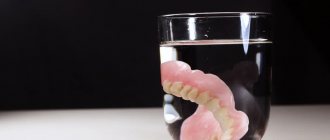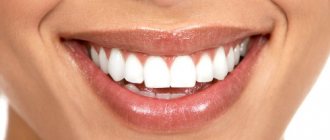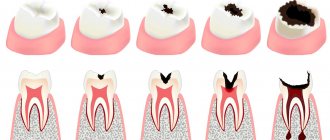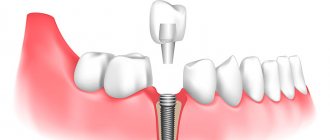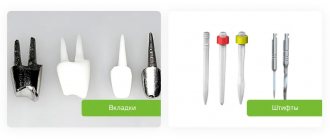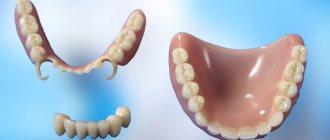Swallowed a tooth crown, how long will it come out?
Swallowed a tooth crown.
A dental crown, no matter what material it is made of, has a certain service life.
Even if, according to the manufacturer, it is quite long, thanks to the material and manufacturing technology of the structure, it is still limited.
Replacement or re-installation of crowns must be carried out approximately every 10 years, otherwise you can inevitably join the list of people who frantically search on the Internet for an answer to the question: “I swallowed a tooth crown, what should I do?”
Stock
-47%
Dental implant Osstem 35,000 rub.
18500 rub.
get -9 %
BASAL COMPLEX - Restoration of teeth on 1 jaw in 3 days 330,000 rub.
300,000 rub.
get -47 %
Dental implantation RUB 18,500.
until 01/15/2022 35,000 rub. 18500 rub.
get -10 %
Premium implantation Nobel and zirconium dioxide crown 150,000 rub.
135,000 rub. get
What complications may arise?
It is necessary to understand the danger of a crown getting into the human digestive tract.
The materials from which dental structures are made are non-toxic.
But chips and sharp edges can cause unpleasant consequences.
Therefore, if a crown has been swallowed partially or entirely, you should immediately contact a gastroenterologist, surgeon, or at least the nearest emergency room.
The danger of this situation is that if foreign bodies enter the digestive tract, complications such as:
- Perforation (perforation) of the wall of the digestive tract.
- Bleeding caused by injury to the walls of the digestive system.
- Intestinal obstruction.
If relief measures are not taken in time, the outcome can be fatal.
Clinical cases
- While eating, the patient accidentally swallowed a crown that was held in place with temporary cement after three weeks of use. She consulted a doctor, and after the examination the patient’s condition was brought under control.
- Two hours after visiting the dentist, the patient swallowed a crown that was fixed to the implant. During the X-ray examination, it turned out that the structure was located in the small intestine. The patient was advised to wait for the crown to come out naturally.
- After a month ago the patient swallowed a crown with a pin and it still did not come out, he returned to the doctor. The man had several photographs in his hands that indicated the location of the structure. All the time, the patient was observed by a surgeon, who rightly chose a wait-and-see approach. Analyzes, survey photographs to determine the movement of the structure and other necessary examinations were carried out regularly. A special diet, laxatives, and enemas were prescribed. There was no result. According to the last image, the crown remained in the same place. Since at the time of treatment the patient complained of stabbing pain in the right iliac region, worsening after eating, a decision was made to perform surgical intervention.
- The patient had a dental crown held in place by temporary cement for three weeks, but unexpectedly she swallowed it along with food. I turned to a surgeon for help. Was examined. Based on the results, it was decided to monitor her condition.
- The patient received an implant with a temporary crown. On the same day she swallowed the crown. The X-ray showed an object in the small intestine. Since there was no threat to the patient’s health, she was advised to monitor the release of a foreign body during defecation.
- Within a month, the crown swallowed by the patient along with the pin did not come out of the intestine. At the same time, he began to experience stabbing pain in the hypochondrium on the right. The pain intensified while eating. All this time, the patient was under the supervision of a doctor; several x-rays were taken, indicating that the swallowed structure did not change location. Despite the prescription of a special diet, laxatives and enemas, there was no movement of the crown in the intestines. As a result, taking into account the patient’s condition, surgery was prescribed to remove the foreign object.
Rehabilitation period
Despite the fact that the operation of implanting a pin is an ordinary procedure, after the manipulations the patient must follow some rules.
- After the pinning operation, the doctor prescribes antibiotics and, if necessary, other drugs. All instructions must be followed according to the scheme, otherwise the risk of developing an inflammatory process will increase, which will lead to rejection of the structure.
- For daily oral hygiene procedures, it is recommended to purchase a brush with soft bristles, so as not to unnecessarily injure the jaw area with the pin. Brushing your teeth should be done twice a day.
- The menu is designed to include soft food dishes. To do this, during cooking, it is better to grind the food with a grater or blender.
- You should forget about toothpicks, at least for a while until the wound heals. Any mechanical loads can provoke rejection of the pin from the soft tissues.
Consequences
You need to understand what will happen if you swallow a piece or splinter of a tooth. Some complications may occur that harm both the adult and the child.
If a temporary filling with arsenic is swallowed, there is virtually no risk of poisoning: dentistry uses a special paste that contains a small amount of the toxic substance.
We suggest you read What to eat after wisdom tooth removal
Ingestion of arsenic during childhood can in some cases provoke symptoms of nausea; if such symptoms occur, you should consult your pediatrician.
Little Mouse VS Tooth Fairy
Loss of baby teeth in children is associated with rituals in different countries. In Russia, back in ancient times (since the 18th century), there was a belief that a lost tooth should be put in the hole of a mouse and in return ask it for a permanent one, which will be healthy and durable.
In the West, instead of a mouse, the Tooth Fairy is popular, which exchanges a baby tooth placed under the pillow for money. This is precisely the reason why children in Russia nowadays prefer to “cooperate” with her.
What to do: first aid for adults and children
It is important to know what to do if a person swallows a denture or a tooth crown. First aid for swallowing foreign objects depends on the size and individual characteristics of the person. Most often, objects come out naturally and do not cause discomfort.
Depending on the type of object that has entered the human digestive tract, the following measures must be taken:
- Crown. If there are no unpleasant symptoms, you must wait for the natural release of the particle. If there are crown fractures, the stomach should be washed and an x-ray taken.
- If a tooth is swallowed, you need to find out if there are any chips there. If there are no sharp particles, no action should be taken.
- Denture. It is necessary to monitor the person’s well-being. If necessary, rinse the stomach with plenty of warm water.
- If the pin is swallowed, damage to the mucous membrane of the digestive organs may occur. Therefore, you should not take any measures on your own. The pin must be removed using a special device by specialists.
A child's body is more sensitive to various foreign particles. Therefore, you need to do the following:
- Crown - in childhood, if a part gets into the digestive tract, you should contact a gastroenterologist and consult. Most often, gastric lavage is prescribed to remove the foreign particle.
- Tooth – to remove the organism, it is necessary to introduce fresh fruits and foods into the child’s diet that accelerate intestinal motility. If there are chips, it is recommended to seek help from a specialist.
- Denture - if the part is swallowed without damage, first aid is not provided. If there are sharp edges, removal is carried out by a specialist after conducting the necessary type of examination.
- Pin - if an object gets into the stomach, you must go to the hospital for an X-ray examination of the digestive organs. It is forbidden to take measures on your own.
If a child has swallowed a baby tooth, the following procedure must be followed:
- examine the oral cavity for chips;
- give the child a large amount of warm drinks to speed up the passage of particles through the digestive organs;
- If you observe unpleasant symptoms, contact a medical facility.
Situations with baby teeth getting into the stomach are common, but very rarely cause complications.
Tip #5: Make an appointment with your dentist
The dentist will help you restore the damage and restore the beauty and functionality of your tooth. But here it is important to take into account that if the artificial crown has been swallowed completely or a large part of it is missing, then it will have to be completely replaced, because In this case, it will be simply impossible to restore the structure. If the top layer has chipped, for example, the crown was made of metal-ceramics or ceramics, and a small piece of ceramic has fallen off, then the doctor will carry out the restoration right at the appointment.
A chip in the upper can be corrected by restoration without removing the crown.
Similarly, a crown will have to be installed on a decayed natural tooth, or, depending on the scale of the destruction, it will be possible to get away with either a composite build-up, or the tooth will have to be built up first using a pin or stump tab.
In general, be sure to visit the dentist every six months. After all, then a specialist will be able to identify the problem in time during a preventive examination and eliminate it before an unpleasant situation associated with swallowing a crown occurs to you. If you ignore going to the doctor, then you simply may not notice, for example, that a tooth has become loose or needs restoration, or that an artificial crown has already expired or needs to be replaced.
Notice
: Undefined variable: post_id in
/home/c/ch75405/public_html/wp-content/themes/UltraSmile/single-item.php
on line
45 Notice
: Undefined variable: full in
/home/c/ch75405/public_html/wp-content /themes/UltraSmile/single-item.php
on line
46
Rate this article:
( 4 ratings, average: 4.75 out of 5)
crown
Doctor's actions
If a foreign body causes discomfort after swallowing, you should consult a gastroenterologist. The specialist will interview the patient to identify the type of foreign body and its size. After which the following procedures are prescribed:
- X-ray examination to identify the location of a foreign body;
- gastric lavage;
- enema (if the object is located in the intestines);
- use of an esophagoscope - prescribed in difficult cases when a pin is swallowed (a foreign body is removed using the device under anesthesia).
After removing the foreign particle with a special device, you need to be observed by a specialist for some time to diagnose damage to the digestive organs.
When do swallowed objects leave the body?
The time it takes for dentures to leave the digestive tract depends on the individual characteristics of the body. Most often this takes several days.
The crown can leave the body for up to 4 days.
What to do if you swallow a dental crown?
With a steel or gold crown, the gingival margin is, by definition, always sharp. The thickness of the metal from which crowns are made is 0.25 hundredths of a millimeter; after annealing, bleaching and polishing, only 0.2 tenths remains, and dental technicians must chamfer the gingival edge, and when you hold such a crown in your hands while polishing, the skin on your fingers You can cut it lightly.
But in my long practice, I have never heard that someone’s intestines or stomach were damaged by a swallowed metal crown. They all exit naturally through the anus. Usually in two or three days.
In the upper front teeth, there is subsidence of the gums on the vestibular or lingual side, especially in the canines. Here you can still be wary, because the edges of the crown will be pointed.
If it doesn’t come out quickly or some painful symptoms appear in the abdominal area, then you will have to go to the doctors, have an x-ray done, monitor the movement of the crown and, if indicated, undergo surgery.
We suggest that you familiarize yourself with the Causes of black plaque on the tongue in adults: a symptom of what diseases
But I repeat, in my memory this has never happened, people swallow bridges and they come out safely. What about the bridges, the stars from the shoulder straps are swallowed with splayed ends and nothing. )
Is there a reason to panic, and what to do if you swallow a denture?
If the doctor, using an x-ray examination, has determined that the swallowed prosthesis does not pose a danger, the patient can only wait. and the foreign body should come out naturally. This time may vary depending on the characteristics of a particular organism, proper nutrition, and the presence of chronic diseases of the digestive system.
If after the specified period of time the crown has not come out, it is worth undergoing a repeat X-ray examination. This will ensure that the object is not stuck and is moving through the intestines.
Tip #4: Adjust your diet
In order for the body to cleanse itself by accelerating intestinal motility, and for the crown to have a greater chance of coming out naturally, you can eat corn, whole grains, solid vegetables and fruits, and it is recommended to drink a lot of water. For example, the same corn passes through the intestines practically unchanged, which means that the crown has exactly the same chances.
If you swallow a crown, do not under any circumstances try to induce vomiting to get it out. This is fraught with the fact that in this case it can get into the respiratory tract and lungs, injuring the intestines, which is truly life-threatening.
Causes of crown loss
The crown becomes loose and falls out for several reasons:
- the cement on which it was held crumbled due to its expiration date;
- the crown is worn out or broken;
- the product was installed with temporary cement, which was not replaced with permanent cement in a timely manner.
A crown is a type of restoration that covers the visible part of the tooth on all sides and is fixed with special cement. Unlike a filling, it can restore one or more surfaces of a tooth, covering the entire tooth.
Thus, the crown can be lost or swallowed due to de-cementation for various reasons.
In modern dentistry, high-quality materials are used for dental prosthetics, but we should not forget that the crown remains not a natural tooth, but a special design. It consists of the body itself, simulating a tooth, a pin for fastening, and a cementing material.
The latter must be of high quality, applied in accordance with technology and in sufficient quantity. If at least one of these conditions is not met, instead of the 5-10 years guaranteed by the doctor, the crown will last no more than a year.
Dental crown
Also, the reasons for the loss of an installed crown include:
- natural aging of the prosthesis after several years;
- mechanical damage, such as trauma from chewing hard food;
- abrasion of the crown base material;
- development of carious process under the structure.
Dental crown
Is it possible to smoke if you have dentures?
There is no direct ban on smoking, but you need to understand that nicotine leads to the formation of a large amount of plaque - both on real and artificial teeth. It is difficult to remove; the gums also suffer because of it - they do not receive enough nutrients, atrophy and expose the tooth roots. If you can’t quit smoking, then try to at least reduce the number of cigarettes you consume to a minimum, at the same time improve hygiene at home, and also visit a doctor every 2-3 months for comprehensive oral hygiene.
Possible complications
Is it dangerous to health if the crown is accidentally swallowed?
Important! It is made of material that is absolutely harmless to the body and will not cause poisoning. But if it has uneven breaks, sharp chips, then this is already serious.
You should immediately seek medical help from a surgeon or specialist. And if unpleasant symptoms appear, but there is no way to get to a doctor, then go to the emergency room.
Possible complications caused by foreign objects entering the esophagus or stomach:
- perforation of the walls of the gastrointestinal tract in any area;
- perforation may be accompanied by bleeding;
- intestinal obstruction.
Swallowing a crown may be painless, but if the crown is damaged and chipped, it can damage the walls of the stomach or intestines.
Such complications, if medical attention is not received in time, can lead to serious consequences, including death.
The loss of a denture causes the appearance of an open wound or unprotected area in its place. Bacteria get there with food and lead to infection. Therefore, when breaking off a crown, it is necessary to rinse the resulting cavity with a disinfectant solution, for example, chlorhexidine, to avoid infection. Next, you need to consult a doctor who will promptly close the wound using temporary materials.
If a dental crown gets into the digestive organs, it can cause problems in their functioning. Sometimes a foreign body causes intestinal disorders, vomiting, and nausea. If you managed to get the swallowed object naturally, then possible symptoms will stop bothering the person almost immediately.
If the crown damages the walls of the esophagus or stomach, the following signs are observed:
- bleeding from the mouth;
- pain when swallowing;
- nausea;
- body temperature rises to 39 °C;
- painful sensations when turning the neck or torso.
This leads to the development of peritonitis, internal bleeding, and intestinal obstruction. In the absence of timely assistance within several days, death from blood loss and general exhaustion of the body cannot be ruled out.
How to properly brush teeth with dentures
The presence of crowns, inlays or dental bridges in your mouth should not embarrass you: you need to care for them and all other teeth in the same way as you did before:
- it is necessary to clean the oral cavity of plaque 2 times a day - morning and evening: using a toothbrush, make vertical movements from the gums to the cutting edge of the tooth, you can supplement such procedures with an irrigator,
- After each meal, you must use an irrigator, dental floss and interdental brushes (as indicated and with caution). Or at least rinse your mouth with a special product, or with regular warm water.
In addition to the restored teeth, living teeth and gums remained in the oral cavity. They need to be looked after, otherwise the risk of their premature loss increases. Remember that gum disease is five times more likely to lead to tooth loss than regular tooth decay and its consequences.
